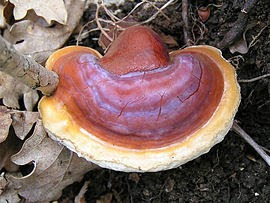Mushrooms are not vegetables but fungi, that is, plants with neither roots nor leaves and without flowers or seeds. Their ideal condition to grow is in the dark while their reproduction occurs through spares spread by the wind. Another characteristic of mushrooms is that, like all other fungi, they lack the chlorophyll needed to transform sunlight into energy.
From a nutritional perspective, mushrooms are very rich foods. Dr. Joel Fuhrman, a well-known American physician who advocates a 'micronutrient-rich diet' and author of Superfoods for Health and Pleasure, has defined mushrooms as the most anti-cancer foods that induce weight loss. He also stated that women who regularly consume mushrooms have a 65% lower risk of breast cancer. This superfood can be classified as such since it contains all sorts of nutrients: from proteins to amino acids, from vitamins B and C to copper, folate, selenium, iron, and the trace mineral germanium, which seems to be able to utilize the oxygen in the body and protect the latter from free radicals. Some mushrooms also contain beta-carotene, which – like selenium - is also a powerful antioxidant.
Though they are so rich in nutrients, mushrooms are very low in calories, and when it comes to their healing properties, they are amazing. Despite their great variety, different characteristics, and nutritional and healing abilities, generally speaking, they are inner system stimulators: they can boost the immune system and, consequently, protect the body from free radicals and certain types of cancer, mutagens, and toxins as well as from cardiovascular disease. Among the mushrooms on top of the list regarding medicinal properties, we find reishi, shiitake, and maitake.
The shiitake mushrooms, Lentinus edodes, are also a highly nutritious kind of fungi that contain proteins, free amino acids, lipids, enzymes, polysaccharides, carbohydrates, fiber, vitamin B-12, and vitamin B-2 (riboflavin) and vitamin C, ergosterol – a pro-vitamin which sunlight converts into vitamin D. In the cultured varieties calcium, manganese, magnesium, potassium, iron, phosphorus, and zinc are also present.
Shiitake mushrooms also contain Lentinus edodes mycelium (LEM) extract and Lentinan, a polysaccharide, which have proven to be tumors and virus inhibitors. They regulate the immune system, turn away bacterial and parasitic infections, improve circulation, increase stamina, protect the liver, promote the production of antibodies to the hepatitis B virus, reduce the side effects from radiation and chemotherapy, and lower the levels of cholesterol and fat in the blood. Shiitake has also been used to treat cancer, HIV/AIDS, herpes simplex, Epstein Barr virus, environmental allergies, Candida infections, high blood pressure, and chronic high cholesterol.
Another Shiitake extract, KS-2, activates macrophages and induces the body to produce interferon, a powerful antiviral and anti-cancer substance. The eritadenine, a shiitake's amino acid, seems to be beneficial in the prevention of heart attack and diabetes by lowering cholesterol, refraining from the formation of blood clots, and regulating sugar levels.
Lentinan is a potent anti-cancer agent in both Shiitake and Reishi mushrooms, which has proven to have antitumor properties and is used in Japanese hospitals to treat cancer. Other research suggests that Lentinan may have the potential also to fight AIDS. It has demonstrated anti-HIV activity, and in a US study, 30 percent of patients taking Lentinan and who were all HIV positive showed an increase in their T-cell counts after twelve weeks (p. 151)
The maitake mushroom, or Grifola frondosa, also called the “king of the mushrooms” due to its healing properties, contains many nutrients, including “protein, fiber, amino acids, vitamin C, vitamin B-12, vitamin B-2 (riboflavin), magnesium, potassium, and phosphorus.” Through its use, the immune system's ability is stimulated and strengthened thanks to the beta-glucans that contain and which, over the years, have proven to be able and prevent T-cells from being destroyed by HIV. Maitake mushrooms have also been shown to reduce chemotherapy side effects such as vomiting, appetite, and hair loss, as well as to fight “high blood pressure, high cholesterol, cardiovascular and liver diseases.... candida, constipation, and obesity...” along with “regulating endocrine functions” and “Alzheimer's disease, osteoporosis, chronic fatigue syndrome, and hair loss.” (p. 168)
According to the old Chinese Taoist tradition, Shiitake, Maitake, Reishi, Ganoderma, and other mushrooms could grant immortality. (p. 295).
Maria Teresa De Donato©2015-2023 All Rights Reserved.




